 updates
updates
 history
history
 art
art
 messages
messages
|
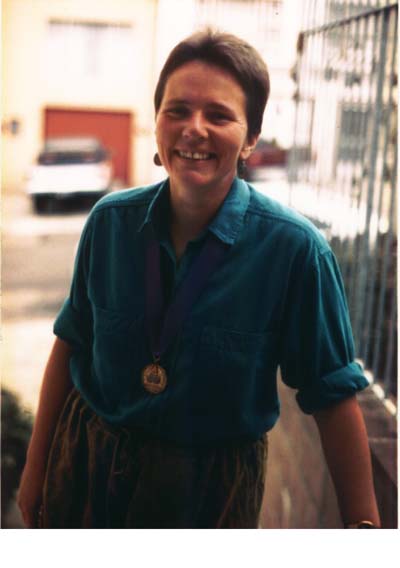 Article from the March 31, 2005 edition of
Article from the March 31, 2005 edition of
The Bay Area Reporter in San Francisco
"Serving the LGBT Community Since 1971"
Lecture photos by Jim Block at blockphoto@earthlink.net
(Click on lecture photos for full images)
Remembering Mary Dunlap
It was an animated crowd of students, LGBT and genderqueer folks, seniors,
leftist lawyers, activists, law school faculty and the general public who
gathered in Booth Auditorium at UC Berkeley on February 24 to hear the
first Mary C. Dunlap Memorial Lecture on Sex, Gender and Social
Justice.
Mary Dunlap, who died of pancreatic cancer at age 54 in 2003, was a
beloved civil rights lawyer, poet, artist, and teacher -- and my life
partner for nearly 20 years.
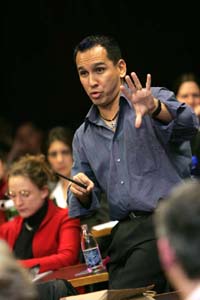 LGBT activists who've been in San Francisco since the early 80's know Mary
as the ground-breaking lawyer who, for example, sued the INS on behalf of
the Gay Freedom Day Parade to overturn the policy that automatically
barred gay people from entering the U.S., and who took the fight over the
Gay Olympics' right to use that name all the way to the U.S. Supreme
Court.
LGBT activists who've been in San Francisco since the early 80's know Mary
as the ground-breaking lawyer who, for example, sued the INS on behalf of
the Gay Freedom Day Parade to overturn the policy that automatically
barred gay people from entering the U.S., and who took the fight over the
Gay Olympics' right to use that name all the way to the U.S. Supreme
Court.
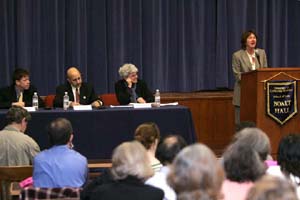 What many people don't know, however, is how she inspired generations of
LGBT lawyers, activists and legal scholars across the nation, through her
forward-thinking legal writing, teaching and litigation.
What many people don't know, however, is how she inspired generations of
LGBT lawyers, activists and legal scholars across the nation, through her
forward-thinking legal writing, teaching and litigation.
Some representatives of those generations were in Berkeley Thursday night
for the first Mary Dunlap Lecture, an event organized by the Boalt Law
School's Center for Social Justice to bring together the legal community
and general public to hear about this year's topic, "Same-Sex Marriage and
Beyond: What Now?"
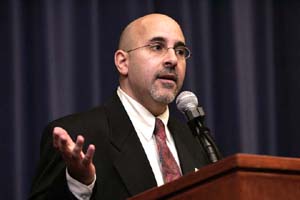 Evan Wolfson, longtime gay civil rights lawyer from New York,
recalled Mary's strategy for "building topsoil" in social change
movements. He said we must "lose forward" by engaging the gay marriage
battle even in states where it can't be won. "Moving public opinion from
30% support to 40% support" is crucial, as is "empowering more voices in
every corner of the country to champion equality, and enlisting more
diverse messengers with compelling stories, gay and non-gay, in this
debate."
Evan Wolfson, longtime gay civil rights lawyer from New York,
recalled Mary's strategy for "building topsoil" in social change
movements. He said we must "lose forward" by engaging the gay marriage
battle even in states where it can't be won. "Moving public opinion from
30% support to 40% support" is crucial, as is "empowering more voices in
every corner of the country to champion equality, and enlisting more
diverse messengers with compelling stories, gay and non-gay, in this
debate."
Evan, who was co-counsel in the landmark Hawaii case that launched the
current national debate on gay marriage and also founded Freedom to Marry,
urged the audience to seize this "civil rights moment". He asked us to
do something every day to sway the reachable, fair-minded public, and to
press our legislators for passage of Mark Leno's civil marriage bill.
"There is very little," he said, "that will be more transformative in this
political movement to end discrimination than to have that bill enacted by
the legislature of the largest state, and signed in to law by that
governor."[1]
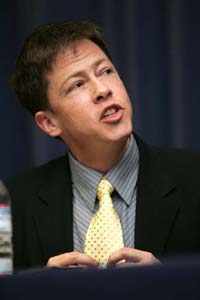
Co-lecturer Paisley Currah is a political science professor at the
City University of New York (CUNY) and co-founder of the Transgender Law
and Policy Institute. He told the audience how transgender activists were
deeply influenced by Mary's early conviction—expressed in a 1979 law
journal article—that "the concerns of transsexual people, of
cross-gendered people, of anyone lacking equality because of the rigidity
of gender norms, were centrally related to the struggle for equality for
gay and lesbian people".
Paisley said that some leftists worry that "by asking for state
recognition of same-sex marriage, we're asking the state to let us
participate in a bad institution, because marriage has historically been
used to subjugate women and to restrict access to resources—such as
health care and survivor social security benefits". He went on to talk
about how working for same-sex marriage addresses the real and very
pressing needs of individuals in the here and now, and does not have to
undercut more radical approaches.
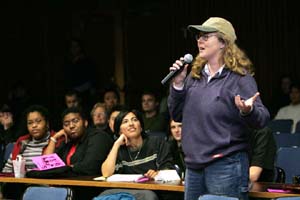 The question-and-answer period that followed was spirited and intense, as
good personal and political discussions always are. Someone questioned
whether fighting for same-sex marriage diverted resources from other
needed reforms, like universal health care. Another spoke about the lack
of legal protection for children of gay couples. A lesbian talked
through
tears about how she and her partner have to "go into exile" from the U.S.
because one is a non-citizen and they can't legally marry, provoking a
discussion about both marriage and wider immigration reform.
The question-and-answer period that followed was spirited and intense, as
good personal and political discussions always are. Someone questioned
whether fighting for same-sex marriage diverted resources from other
needed reforms, like universal health care. Another spoke about the lack
of legal protection for children of gay couples. A lesbian talked
through
tears about how she and her partner have to "go into exile" from the U.S.
because one is a non-citizen and they can't legally marry, provoking a
discussion about both marriage and wider immigration reform.
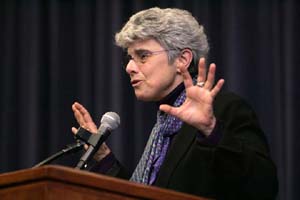 Moderator Rhonda Copelon, a law professor and longtime feminist
litigator and activist who heads the International Women's Human Rights
Clinic at CUNY Law School, ended the night by reading from an essay on
Mary by Wendy Williams, a professor at Georgetown Law School in
Washington, D.C.:
Moderator Rhonda Copelon, a law professor and longtime feminist
litigator and activist who heads the International Women's Human Rights
Clinic at CUNY Law School, ended the night by reading from an essay on
Mary by Wendy Williams, a professor at Georgetown Law School in
Washington, D.C.:
"Mary Cynthia Dunlap, larger than life, a force of nature, who filled up a
room with her presence, her tall solid self, her waving arms, her energy,
her laugh, her voice and words and words and more words ... Mary the
lawyer, all reasoned passion and passionate reason, fighting for justice,
for equality, for dignity and respect, for liberation."
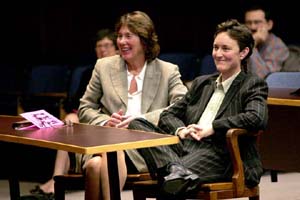 It's terribly strange to be talking about Mary in the past
tense—Mary, who always spoke so eloquently for herself! Mary, who
had such unshakeable faith in what she once called "a future generous and
warm with choices". It's my hope that in coming years the Dunlap Lecture
will bring Mary into our future. I hope it will provoke us to
think about what envelope Mary would be pushing now, whom she'd be
shocking now, what voices she'd be drawing into the conversation now,
how'd she'd be inspiring us, and making us laugh—right now.
It's terribly strange to be talking about Mary in the past
tense—Mary, who always spoke so eloquently for herself! Mary, who
had such unshakeable faith in what she once called "a future generous and
warm with choices". It's my hope that in coming years the Dunlap Lecture
will bring Mary into our future. I hope it will provoke us to
think about what envelope Mary would be pushing now, whom she'd be
shocking now, what voices she'd be drawing into the conversation now,
how'd she'd be inspiring us, and making us laugh—right now.
—Maureen Mason
Tax-deductible contributions are what will keep this memorial
lecture series going in the future. Can you help? Here is how
you can make a
donation. Thank you!
[1]
In July, 2005, the California State Senate's Judiciary Committee voted
Leno's bill out to the full Senate, where it is expected to pass.
The bill faces an uphill battle in the State Assembly, however, in spite
of support by the State Assembly Speaker, Fabian
Núñez, who took the dramatic step of signing on as an author
of the bill together with the six openly gay and lesbian
members of the California State Legislature.
It is vitally important that Californians contact their Assembly
Members as soon as the Legislature returns from its summer break on
August 15, stating that they support AB 1967, Mark Leno's "Marriage
License Non-Discrimination Act." [back to text]
|
Article from the March 31, 2005 edition of
LGBT activists who've been in San Francisco since the early 80's know Mary as the ground-breaking lawyer who, for example, sued the INS on behalf of the Gay Freedom Day Parade to overturn the policy that automatically barred gay people from entering the U.S., and who took the fight over the Gay Olympics' right to use that name all the way to the U.S. Supreme Court.
What many people don't know, however, is how she inspired generations of LGBT lawyers, activists and legal scholars across the nation, through her forward-thinking legal writing, teaching and litigation.
Evan Wolfson, longtime gay civil rights lawyer from New York, recalled Mary's strategy for "building topsoil" in social change movements. He said we must "lose forward" by engaging the gay marriage battle even in states where it can't be won. "Moving public opinion from 30% support to 40% support" is crucial, as is "empowering more voices in every corner of the country to champion equality, and enlisting more diverse messengers with compelling stories, gay and non-gay, in this debate."

The question-and-answer period that followed was spirited and intense, as good personal and political discussions always are. Someone questioned whether fighting for same-sex marriage diverted resources from other needed reforms, like universal health care. Another spoke about the lack of legal protection for children of gay couples. A lesbian talked through tears about how she and her partner have to "go into exile" from the U.S. because one is a non-citizen and they can't legally marry, provoking a discussion about both marriage and wider immigration reform.
Moderator Rhonda Copelon, a law professor and longtime feminist litigator and activist who heads the International Women's Human Rights Clinic at CUNY Law School, ended the night by reading from an essay on Mary by Wendy Williams, a professor at Georgetown Law School in Washington, D.C.:
It's terribly strange to be talking about Mary in the past tense—Mary, who always spoke so eloquently for herself! Mary, who had such unshakeable faith in what she once called "a future generous and warm with choices". It's my hope that in coming years the Dunlap Lecture will bring Mary into our future. I hope it will provoke us to think about what envelope Mary would be pushing now, whom she'd be shocking now, what voices she'd be drawing into the conversation now, how'd she'd be inspiring us, and making us laugh—right now.